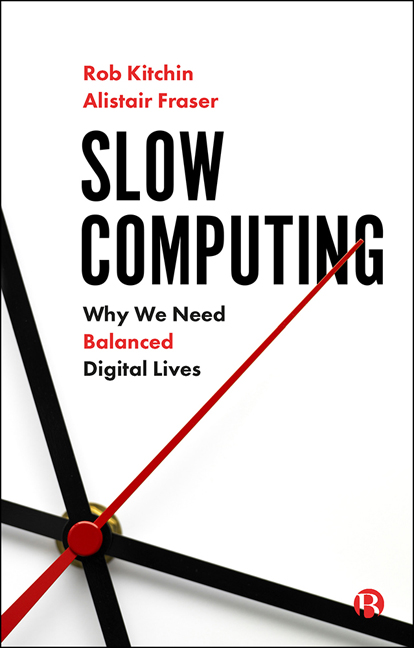Book contents
- Frontmatter
- Dedication
- Contents
- About the authors
- Acknowledgements
- 1 Living Digital Lives
- 2 Accelerating Life
- 3 Monitoring Life
- 4 Personal Strategies of Slow Computing
- 5 Slow Computing Collectively
- 6 An Ethics of Digital Care
- 7 Towards a More Balanced Digital Society
- Coda: Slow Computing During a Pandemic
- Notes
- Index
3 - Monitoring Life
Published online by Cambridge University Press: 12 March 2021
- Frontmatter
- Dedication
- Contents
- About the authors
- Acknowledgements
- 1 Living Digital Lives
- 2 Accelerating Life
- 3 Monitoring Life
- 4 Personal Strategies of Slow Computing
- 5 Slow Computing Collectively
- 6 An Ethics of Digital Care
- 7 Towards a More Balanced Digital Society
- Coda: Slow Computing During a Pandemic
- Notes
- Index
Summary
Wednesday. It's 10.30am and you’re heading out to grab a coffee at your favourite spot, Lou's Café. Swiping your staff card, you exit the building, passing the security booth, glancing up at the cameras watching you leave. You tap your phone to hail a rideshare cab, which arrives just a minute later and takes you toward the town centre. At the coffee shop you pay with a tap of your debit card, collecting points with your loyalty card. While you wait for the coffee, you notice a screen near the milk which flashes an ad directed right at you, your name at the top: ‘Make warts a thing of the past. Get 20% off our cream at Chem-Care. Scan the QR code for an in-store voucher.’ That was embarrassing. You wish these ads were less intrusive. Checking your phone out of habit – why is this coffee taking so long to arrive; you’ve been waiting a minute already – you see another ad for Chem-Care, which is now offering a twofor-one on wart cream if you tweet about Lou's Café.
In today's digital world, the line between your public persona and private affairs is blurring. The scenario above is an exaggeration: chances are, an imaginary company like Chem-Care wouldn't actually direct such a personal ad in public like that, although tying your purchase in one venue to your location in another is already happening. What you think is your private business – you have a couple of warts, they’re annoying, you’re bothered by them, and you’d rather not advertise this to others – is now a business opportunity that algorithms can identify and use as the basis for steering your future purchases in a specific direction. Massive investments are being made right now by all sorts of companies to capitalize on and monetize these sorts of opportunities. Whether it is information based on your online search activity or the places you frequent when you’re out spending money, you’re now just one of billions of other targeted humans.
Digital life demands and creates data shadows and footprints made up of trillions of our individual responses to the prompts and invitations playing out on our devices, the services located within them, and the world at large.
- Type
- Chapter
- Information
- Slow ComputingWhy We Need Balanced Digital Lives, pp. 49 - 75Publisher: Bristol University PressPrint publication year: 2020



